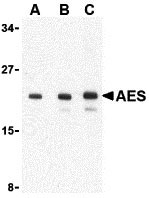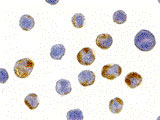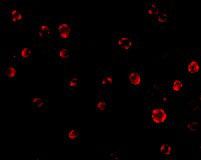AES Antibody
- SPECIFICATION
- CITATIONS
- PROTOCOLS
- BACKGROUND

Application
| WB, IF, ICC, E |
|---|---|
| Primary Accession | Q08117 |
| Other Accession | NP_945320, 39812019 |
| Reactivity | Human, Mouse, Rat |
| Host | Rabbit |
| Clonality | Polyclonal |
| Isotype | IgG |
| Calculated MW | 21970 Da |
| Application Notes | AES antibody can be used for the detection of AES by Western blot at 1 - 4 µg/mL. Antibody can also be used for immunocytochemistry starting at 10 µg/mL. For immunofluorescence start at 20 µg/mL. |
| Gene ID | 166 |
|---|---|
| Other Names | AES Antibody: GRG, ESP1, GRG5, TLE5, AES-1, AES-2, GRG, Amino-terminal enhancer of split, Gp130-associated protein GAM, Amino enhancer of split, amino-terminal enhancer of split |
| Target/Specificity | AES; |
| Reconstitution & Storage | AES antibody can be stored at 4℃ for three months and -20℃, stable for up to one year. As with all antibodies care should be taken to avoid repeated freeze thaw cycles. Antibodies should not be exposed to prolonged high temperatures. |
| Precautions | AES Antibody is for research use only and not for use in diagnostic or therapeutic procedures. |
| Name | TLE5 (HGNC:307) |
|---|---|
| Synonyms | AES, GRG, GRG5 |
| Function | Transcriptional corepressor. Acts as a dominant repressor towards other family members. Inhibits NF-kappa-B-regulated gene expression. May be required for the initiation and maintenance of the differentiated state. Essential for the transcriptional repressor activity of SIX3 during retina and lens development. |
| Cellular Location | Nucleus. |
| Tissue Location | Found predominantly in muscle, heart and Placenta. In fetal tissues, abundantly expressed in the heart, lung, kidney, brain and liver |

Thousands of laboratories across the world have published research that depended on the performance of antibodies from Abcepta to advance their research. Check out links to articles that cite our products in major peer-reviewed journals, organized by research category.
info@abcepta.com, and receive a free "I Love Antibodies" mug.
Provided below are standard protocols that you may find useful for product applications.
Background
AES Antibody: Adhesion to extracellular matrix regulates cell survival through both integrin engagement and appropriate cell spreading. Anoikis is the molecular mechanism of apop-tosis induced by integrin detachment. Amino-terminal enhancer of split (AES) is a member of the Groucho/ transducin-like enhancer of split (TLE) family of transcriptional regulators, a group of transcriptional co-repressors that play important roles in neurogenesis, segmentation, and sex determination. AES forms a complex with Bit1 (Bcl-2 inhibitor of transcription 1), a mitochondrial protein that is released into the cytoplasm upon onset of apoptosis. It has been suggested that this complex turns off a survival-promoting gene transcription program controlled by the TLE protein family. Interestingly, apoptosis of cells transfected with AES and Bit1 could be inhibited if the cells were allowed to attach to fibronectin through the alpha5beta1 integrin suggesting that the Bit1-AES pathway contributing to anoikis is regulated by integrins, and in particular, the alpha5beta1 integrin.
References
Martin SS and Vuori K. Regulation of Bcl-2 proteins during anoikis and amorphosis. Biochim Biophys Acta. 2004; 1692:145-57.
Miyasaka H, Choudhury BK, Hou WE, et al. Molecular cloning and expression of mouse and human cDNA encoding AES and ESG proteins with strong similarity to Drosophila enhancer of split groucho protein. Eur. J. Biochem. 1993; 216:343-52.
Chen G and Courey AJ. Groucho/TLE family proteins and transcriptional repression. Gene 2000; 249:1-16.
Jan Y, Matter M, Pai J-t, et al. A mitochondrial protein, Bit1, mediates apoptosis regulated by integrins and groucho/TLE corepressors. Cell 2004; 116:751-762.
If you have used an Abcepta product and would like to share how it has performed, please click on the "Submit Review" button and provide the requested information. Our staff will examine and post your review and contact you if needed.
If you have any additional inquiries please email technical services at tech@abcepta.com.













 Foundational characteristics of cancer include proliferation, angiogenesis, migration, evasion of apoptosis, and cellular immortality. Find key markers for these cellular processes and antibodies to detect them.
Foundational characteristics of cancer include proliferation, angiogenesis, migration, evasion of apoptosis, and cellular immortality. Find key markers for these cellular processes and antibodies to detect them. The SUMOplot™ Analysis Program predicts and scores sumoylation sites in your protein. SUMOylation is a post-translational modification involved in various cellular processes, such as nuclear-cytosolic transport, transcriptional regulation, apoptosis, protein stability, response to stress, and progression through the cell cycle.
The SUMOplot™ Analysis Program predicts and scores sumoylation sites in your protein. SUMOylation is a post-translational modification involved in various cellular processes, such as nuclear-cytosolic transport, transcriptional regulation, apoptosis, protein stability, response to stress, and progression through the cell cycle. The Autophagy Receptor Motif Plotter predicts and scores autophagy receptor binding sites in your protein. Identifying proteins connected to this pathway is critical to understanding the role of autophagy in physiological as well as pathological processes such as development, differentiation, neurodegenerative diseases, stress, infection, and cancer.
The Autophagy Receptor Motif Plotter predicts and scores autophagy receptor binding sites in your protein. Identifying proteins connected to this pathway is critical to understanding the role of autophagy in physiological as well as pathological processes such as development, differentiation, neurodegenerative diseases, stress, infection, and cancer.




